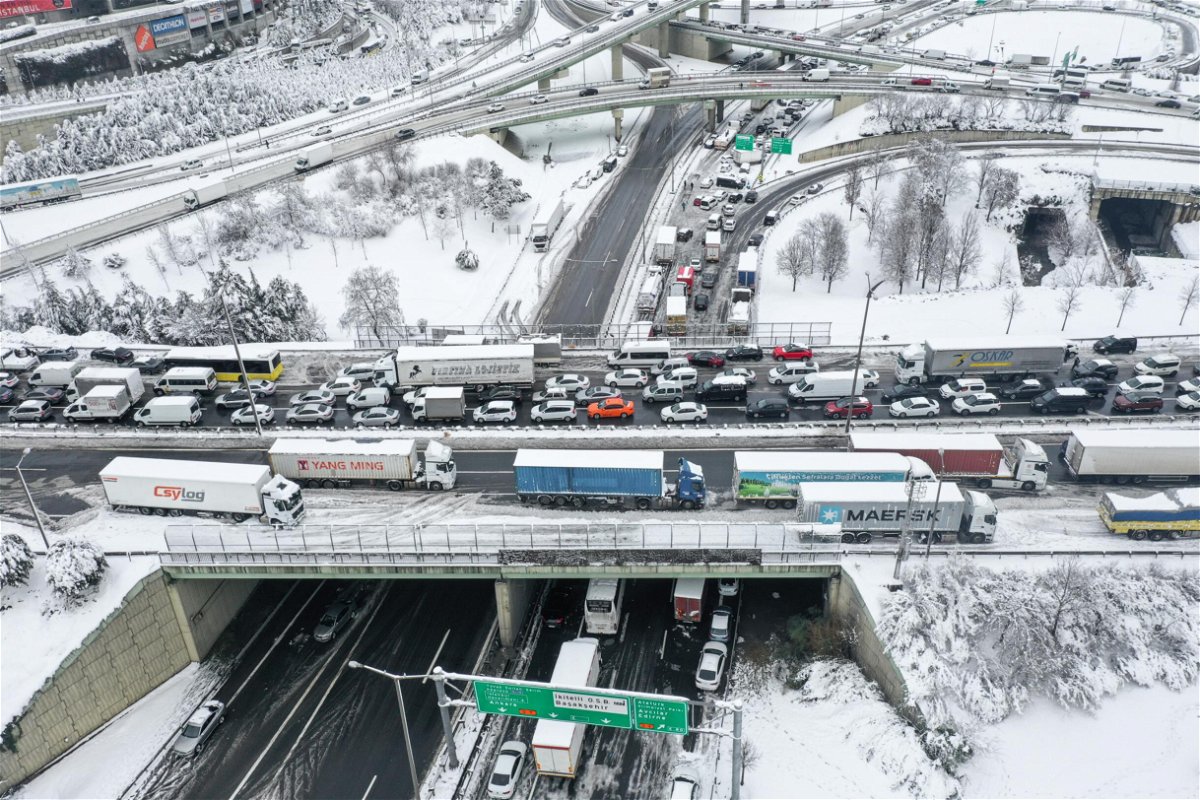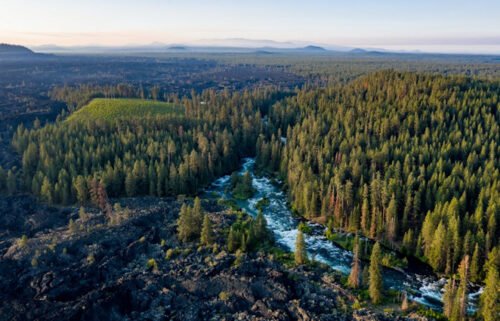Snow blankets Greece and Turkey as wild weather system creates rare ‘snownado’

Vehicles stuck on a snow-covered road after heavy snowfall hit Istanbul.
Story by Reuters and CNN Weather’s Pedram Javaheri and Robert Shackelford
A rare and severe snowstorm has blanketed parts of Greece and Turkey, causing chaos on the streets of major cities and forcing the evacuation of thousands of people.
Storm Elpida swept across Greece on Monday, covering Athens with heavy snow, which rarely falls in the Greek capital but has now occurred in a second consecutive year.
Athens has only seen six snow events since 2000, and while it usually experiences average snowfall of 1.3 centimeters (0.5 inches) annually, Elpida has already brought around 8 centimeters (3.1 inches), the most since February 2021, when 10 centimeters (3.9 inches) fell. The islands of Mykonos and Santorini also experienced rare snowfalls.
Parts of Athens were hit by power cuts, and the grid operator said crews were working to restore electricity.
Rescue crews, including the army, worked through the night to assist thousands of people stranded in their cars on a motorway in the Greek capital after the snowstorm swept through the country on Monday.
As temperatures fell overnight, soldiers handed out food, water and blankets to drivers, some of whom were stranded for more than 10 hours. TV footage showed the road and vehicles covered in snow.
More than 3,500 people had been evacuated by early Tuesday, some abandoning their cars on foot; around 1,200 cars remained stuck on the Attiki Odos, the capital’s main ring-road, government spokesperson Giannis Oikonomou said.
“We had a very difficult night and a superhuman evacuation effort is underway on Attiki Odos,” Oikonomou told Greek television.
“We are still in a very difficult phase, as the forecasts indicate that we will face [weather] difficulties again in a while,” he said.
Authorities declared Tuesday a public holiday, shutting public offices and private businesses except supermarkets, pharmacies and petrol stations in the greater Athens area and on some islands.
Fifteen passengers were injured when a rail transport vehicle tried to pull a train carrying about 200 passengers which had halted in heavy snow in central Greece.
The erratic winter weather comes after a summer of high temperatures and wildfires in Greece, which scientists linked to the climate crisis.
Monday’s storm also triggered a rare ‘snownado,’ a tornado-like funnel traveling over a snow-covered landscape, after a waterspout moved onshore, swirling snow around the base of the twister.
Snow covered the capital from the Acropolis hill to the coast in the south and brought Covid-19 vaccinations to a halt, forced schools to close and disrupted flights.
Greek carrier Aegean Airlines canceled all but five flights on Monday and said it expected schedules to be disrupted on Tuesday and possibly Wednesday.
Flights were also suspended for a second day at Istanbul Airport in Turkey, and private vehicles were barred from city streets on Tuesday, as heavy snowfall there also snarled traffic and left people stranded in the country’s biggest city and beyond.
Istanbul Airport said on its website that flight operations had been suspended until 10 a.m. GMT (5 a.m. ET) on Tuesday due to adverse weather conditions. Flag-carrier Turkish Airlines said on Monday it had canceled all flights from the airport.
Snowfall in Istanbul began late last week and has picked up in recent days in the city of 16 million people. Footage from the airport — among the world’s largest — showed runways covered in a thick blanket of snow with aircraft and vehicles barely visible.
Istanbul Governor Ali Yerlikaya took the rare step of temporarily banning private cars from the streets until emergency teams are able to clear them, while many public workers were granted administrative leave to keep the number of people commuting to a minimum.
Footage shared by the governor showed trucks and cars stranded along highways in and around the city.
A video posted on social media showed a man skiing through city streets late on Monday, with people waving as he passed.
Far away in Turkey’s south, snow fell on the beaches of the resort city of Antalya for the first time in 29 years.
Istanbul Mayor Ekrem Imamoglu said 55,000 tons of salt had been used on the roads; he called on Turks to clear the snow in front of homes and shops to help emergency teams.
“We hope that if we overcome tonight with measures as well, we won’t have any problems left. May God protect everyone,” he said while visiting a salt facility.
Across the country some 4,600 people were left stranded on roads and elsewhere, and thousands had been placed in temporary housing, the Disaster and Emergency Authority said.
While scientists have not yet analyzed the link between this particular storm and climate change, global warming has pushed average temperatures in the Mediterranean up by more than 1 degree Celsius since the early 1990s, according to the EU’s Copernicus environmental monitoring program.
Sea surface temperatures in the Eastern Mediterranean and Black Sea were around 2 degrees Celsius above average in the lead-up to the snowfall, and that increase in heat would have provided additional energy to the storm as well as added moisture to the air, increasing snowfall.
The-CNN-Wire
™ & © 2022 Cable News Network, Inc., a WarnerMedia Company. All rights reserved.
CNN’s Brandon Miller contributed to this story.



